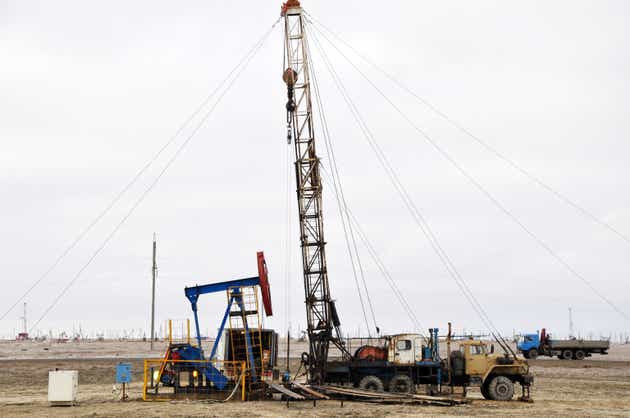 | Read in Browser |
 |
| |  Getty Images BP (NYSE:BP) has become the last of the Big Oil majors to report earnings, and the quarterly report is again getting controversial. Underlying replacement cost profit, used as a proxy for net profit, came in at $8.2B in the third quarter, up from $3.3B recorded in the same period a year ago. It comes at a time when commodity prices have surged, with oil and gas prices fueling inflation, in the aftermath of the coronavirus pandemic and Russia's invasion of Ukraine.
In the crosshairs: "Oil companies' record profits today are not because of doing something new or innovative. Their profits are a windfall of war, a windfall for the brutal conflict that's ravaging Ukraine and hurting tens of millions of people around the globe," President Biden said in a statement. "My team will work with Congress to look at these options that are available to us and others. It's time for these companies to stop war profiteering, meet their responsibilities in this country and give the American people a break and still do very well."
Talk of a windfall tax on energy producers first circulated among progressives, like Bernie Sanders and Elizabeth Warren, but it is now gaining traction in mainstream Democratic circles. Others feel that a tax would disincentivize and reduce current production, leading to even higher prices. They say it would also hurt future hydrocarbon investment, which has been weighed down by a regulatory environment that focuses on greener technologies and fails to address supply and demand imbalances.
Turning to history: The Crude Oil Windfall Profit Tax Act of 1980 was enacted under the Carter administration, and generated some $80B in gross revenues over the next eight years before being repealed by President Reagan. U.S. crude production declined as much as 8% over the period, according to the Congressional Research Service, while Washington grew increasingly concerned that the tax had increased the nation's dependence on imported oil. The CRS also cautions that despite the "windfall" name, it was really in excise tax, that was determined by calculating the "difference between the market price of oil... and a statutory 1979 base price that was adjusted quarterly for inflation and state severance taxes." Better examples may be seen from the "war profiteering" levy enacted during WWI and a similar excess profits tax adopted during WWII.
How much are we talking about? Profits among the Big Oil majors totaled nearly $60B last quarter, including U.S.-based Exxon Mobil (XOM) (+191% Y/Y to $19.7B) and Chevron (CVX) (+84% to $11.2B), as well as Europe's BP (+145% to $8.2B), Shell (SHEL) (+129% to $9.5B), Eni (E) (+161% to $3.7B) and TotalEnergies (TTE) (+43% to $6.6B). American energy giant ConocoPhillips (COP), which was often included in the list prior to spinning off its downstream operations into Phillips 66 (NYSE:PSX) a decade ago, will report earnings on Thursday. (47 comments)
| | | | | M&A District Court Judge Florence Pan has blocked Penguin Random House's proposed purchase of Simon & Schuster, siding with the U.S. Justice Department that the combination could "substantially" harm and "lessen competition" for "top-selling books." It follows a three-week trial in August that captured the attention of the literary world, and included testimony of famed authors like acclaimed horror writer Stephen King. The $2.2B merger would have reduced the "Big Five" industry publishers from 5 to 4, along with Hachette Book Group, HarperCollins and Macmillan.
Reactions: The DOJ praised the decision, saying it "protects vital competition for books and is a victory for authors, readers, and the free exchange of ideas." On the other side of the fence, Penguin Random House condemned the ruling, relating that it would "immediately request an expedited appeal." The publisher had previously stated that the deal "enhance competition" by pooling its resources, as well as offering better deals to authors that'll force other publishers to "compete harder" for titles.
The fresh antitrust court precedent could extend beyond the publishing world to other industries following recent competition setbacks for the DOJ. U.S. Sugar Corp's $315M deal for rival Imperial was approved by antitrust enforcers, while UnitedHealth's $13B acquisition of Change Healthcare was cleared after a government challenge. The saga is part of a broader competition crackdown by the Biden administration, which has beefed up its campaigns after the signing of an executive order on "Promoting Competition in the American Economy" in July 2021.
Outlook: While a combination with Penguin Random House is not in the cards, Simon & Schuster will still be searching for a new owner. Parent company Paramount Global (NASDAQ:PARA) doesn't see the publisher as part of its future and even committed to divesting the firm before the Penguin Random House merger was announced in late 2020. With further consolidation in the publishing sector ruled out, Simon & Schuster would likely end up in the hands of a private equity firm. (2 comments)
| | Covid China's zero-COVID policy is on full display at Shanghai Disneyland (NYSE:DIS), with visitors temporarily barred from leaving the resort until they were tested for coronavirus. The park was locked down after a single guest tested positive for an infection - a similar event that happened in late 2021 - and follows a two-month closure during Shanghai's lockdown earlier this year. Anyone who visited Disneyland since Oct. 27 will need to test for COVID three times over three days, while its main theme park and attached shopping street will be shuttered until further notice to comply with virus curbs.
Elsewhere: Some turmoil has erupted in the central city of Zhengzhou, particularly at the world's largest iPhone factory. Apple-supplier Foxconn (OTCPK:FXCOF) employs about 200K people at the Zhengzhou complex, which includes dormitory accommodation for workers, but discontent has been growing following an outbreak and strict COVID controls. Foxconn said it has implemented "closed loop management," the official term for staff living at their workplace and having no outside contact, prompting thousands to flee, with some even scaling fences of the facility to escape.
Sources told Reuters that production of the iPhone 14 (NASDAQ:AAPL) could plunge by as much as 30% in November due to tightening COVID restrictions, with Foxconn working to boost production at another factory in Shenzhen to make up for the shortfall before the holiday season. Foxconn, which produces 70% of iPhones globally, also builds the device in India, but its Zhengzhou factory assembles most of its global output.
Go deeper: Since the 20th National Party Congress last month, China's Communist Party has only doubled down on the draconian COVID measures, which seek to eliminate outbreaks as soon as they occur despite the economic cost. Leader Xi Jinping has touted the policy as "protecting the people's health and safety to the greatest extent possible," while "encouraging achievements in both epidemic response and economic and social development." (5 comments)
| | Tech The aftermath of a contentious leveraged buyout of Twitter (TWTR) is underway after billionaire Elon Musk wrapped up a $44B leveraged buyout of the social media platform. A lengthy SEC filing on Monday confirmed a number of previously reported moves: That Musk consummated the purchase, that shares were canceled and converted into the right to receive the planned $54.20 each in cash consideration, and that Musk fired the board and became sole director.
More details: Another filing confirms that Saudi Prince Alwaleed bin Talal rolled some $1.89B in stock into Musk's takeover, making the prince and Kingdom Holding Co. the second-largest investor in Twitter. Reports also suggest Musk is working with a small "war room" of confidants on a series of issues right now, including venture capitalist David Sacks, investor Jason Calacanis, venture capitalist and Twitter-ex Sriram Krishnan, as well as his reps Alex Spiro and Jared Birchall. Kayvon Beykpour - Twitter's former head of product, fired by ex-CEO Parag Agrawal in May, was allegedly spotted in the building again.
In his first major product move, Musk is beginning to remake the company's subscription offering at a substantially higher price, and tie its account verification system to subscriptions. That verified account system - Twitter's "blue checks" next to notable names - had involved an elaborate approach to determine notable posters. Musk has now directed that it be linked to Twitter Blue, the company's subscription service, where the price would go from about $4.99 per month to $19.99 per month. Current verified users would have 90 days to subscribe at the new higher price or lose their verification.
Will it work? Twitter's new aggressive monetization strategy may have some ripple effects for rival social media platforms - particularly Meta Platforms (NASDAQ:META) - whose Facebook is heavily penetrated (it has just under 2B daily active users) and has its own challenges to consider for user monetization. Snap (NYSE:SNAP) is also banking on its own subscription offering called Snapchat+. The company started rolling it out at $3.99 per month in the summer, and CEO Evan Spiegel's September memo laid out a plan to boost revenues 20%, with $350M in new revenue coming from the service. (69 comments)
| | Today's Markets In Asia, Japan +0.3%. Hong Kong +5.2%. China +2.6%. India +0.6%.
In Europe, at midday, London +1.6%. Paris +1.8%. Frankfurt +1.2%.
Futures at 6:30, Dow +0.6%. S&P +0.9%. Nasdaq +1.2%. Crude +1.5% to $87.81. Gold +0.8% to $1654.10. Bitcoin -0.5% to $20,631.
Ten-year Treasury Yield -1 bps to 3.95%
Today's Economic Calendar | | | | | Seeking Alpha's Wall Street Breakfast Podcast Seeking Alpha's Wall Street Breakfast podcast brings you all the news you need to know for your market day. Released by 8:00 AM ET each morning, it is a quick listen that you can put on as you get ready to start your working day. | | | | |










No comments:
Post a Comment